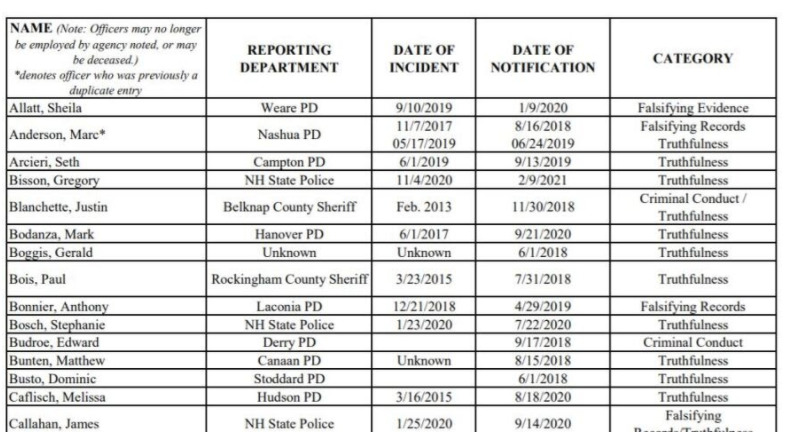Story Produced by NH Public Radio, a Member of

⇒ RELATED STORY 12-30-21: Rochester Police Commisioner was on public Laurie List, then he wasn’t
A list containing the names of New Hampshire police officers that have committed acts calling their credibility into question is finally public, providing the first glimpse of a document subject to lawsuits and calls for release by civil liberties advocates and media outlets for years.
Find the Laurie List below
On Wednesday, the New Hampshire Department of Justice released the first portion of the exculpatory evidence schedule, better known as the Laurie List, revealing the names of 90 police officers, along with a brief, sometimes one-word explanation, for the conduct that landed them on the document.
“Falsifying records,” reads the entry for Anthony Bonnier, who was listed as an officer in Laconia at the time he was added to the list in April 2019. Keene officer Jillian Decker was added to the list in 2021 for “truthfulness.”
Under U.S. Supreme Court precedent established in the 1963 case Brady v. Maryland, prosecutors are required to turn over evidence that is favorable to a defendant. In 1989, Carl Laurie was charged with murder in New Hampshire.
His conviction was later overturned by the state Supreme Court after determining a detective involved in Laurie’s confession had a litany of poor behavior on this record that wasn’t disclosed to defense attorneys, including allegations of verbal abuse and in some cases, choking people who questioned his demeanor.
In the wake of that decision, county attorneys in New Hampshire began keeping lists of police officers with potential credibility issues, which became known as the Laurie List. When an officer whose name is on the list is involved in a criminal case, prosecutors are instructed to disclose that information to defendants.
More recently, the list, renamed the Exculpatory Evidence Schedule, or EES, was managed by the Attorney General’s office. Police officers are normally added to the list by their police chiefs and have the right to appeal that decision in the judicial system.
In 2020, the state Supreme Court ruled the EES was not categorically exempt from disclosure under the state’s transparency laws, but that a lower court needed to determine if the privacy rights of the officers on the list outweighed the public’s interest.
This year, the state legislature passed a bill to release the EES, with the support of police unions, but only after officers were given another opportunity to appeal.
On Wednesday, the names of police officers who were added to the list after May 2018 who do not have ongoing appeals or whose appeals were denied were released publicly. In March 2022, the names of the remaining officers will be released. The EES is believed to contain more than 250 total names.
The DOJ has previously released redacted portions of the list, concealing the names of the officers as well as the dates of the incident that led to their inclusion. A column labeled ‘category’ includes a brief description of the officer’s conduct, including “truthfulness” and “excessive force.”
[Editor’s note: This is a developing story. Check back for updates]
The updated current Laurie List
 These articles are being shared by partners in The Granite State News Collaborative. For more information visit collaborativenh.org.
These articles are being shared by partners in The Granite State News Collaborative. For more information visit collaborativenh.org.








